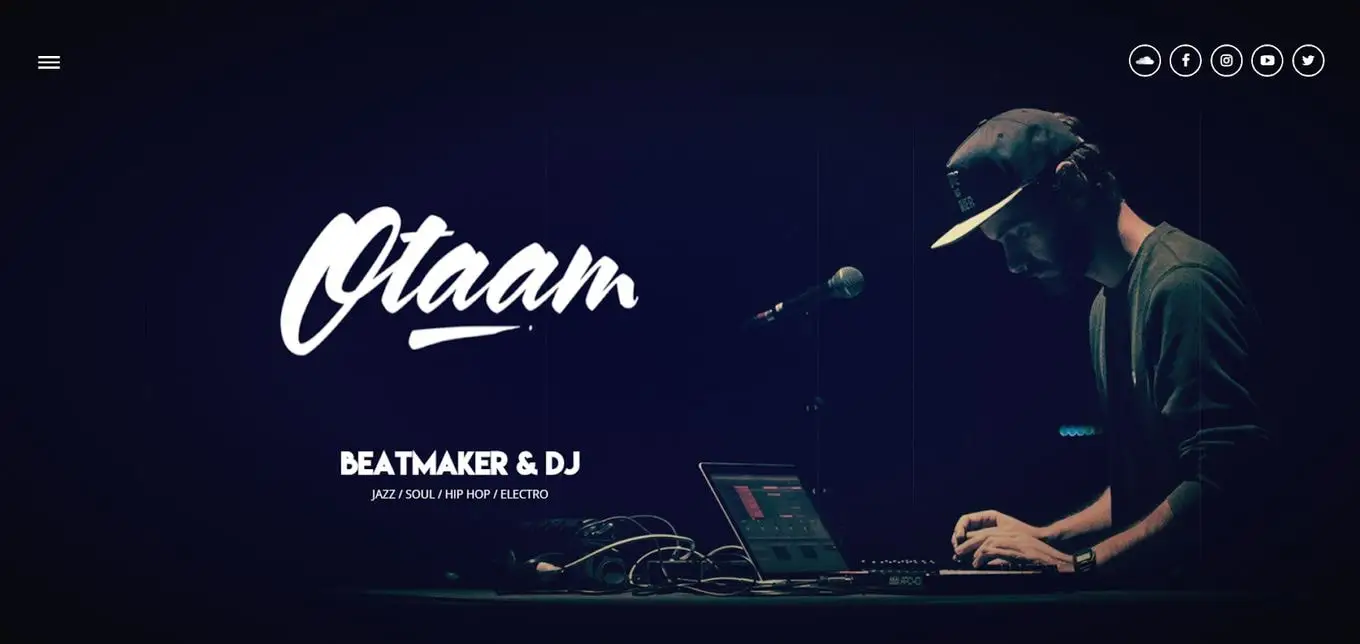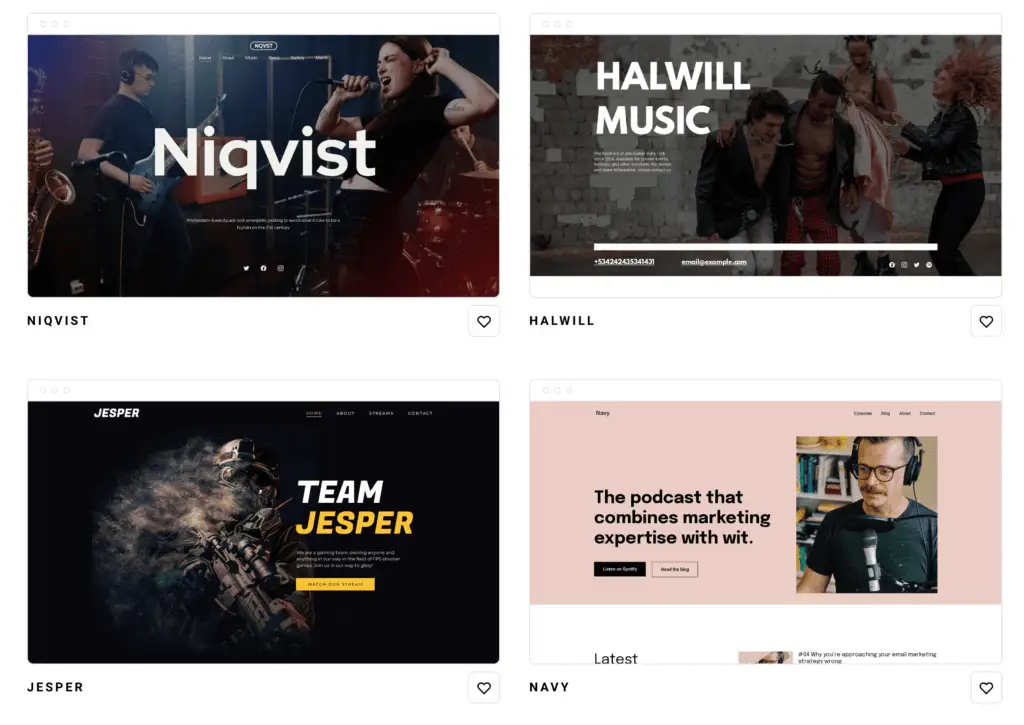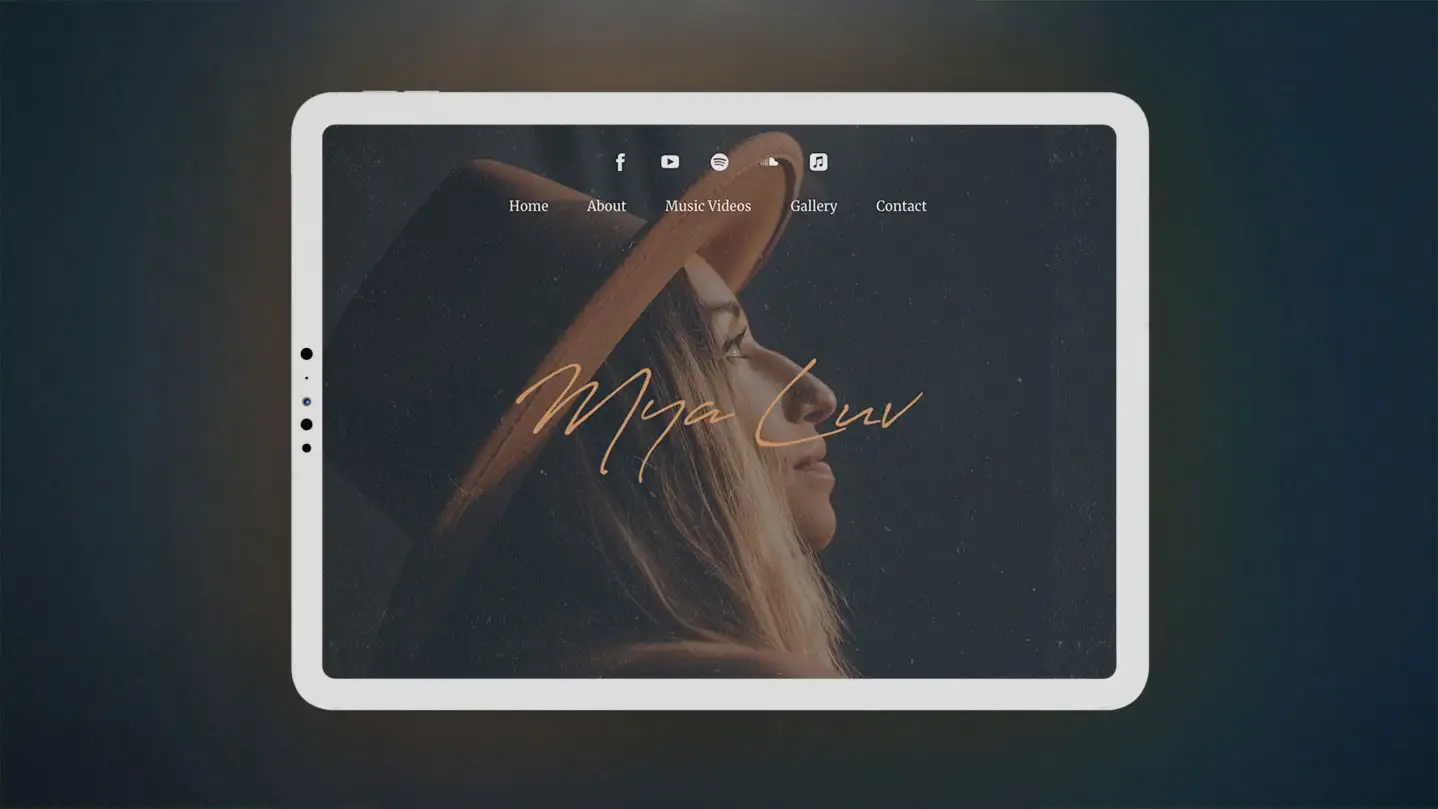When you try to blow up on TikTok with ridiculous 30-second videos and catchy melodies, think about this: regardless of the social media platform you use, you’ll always have to abide by their rules. Which, let’s be honest, really sucks when you’re trying to make music that resonates with you and your fans.
So, how do you escape the rat race that turns every artist into a content creator? Well, you can start by building a fabulous website: an online place where people can stay informed about and support your work, without you having to turn your artistry into a marketing enterprise.
Today, we’ll look into how and why, as an artist, you should have a professional website.
Why You Should Build Your Own Music Website

To put it simply, a musician website gives you total control over the communication happening between you and your fans.
It’s a digital space where byzantine algorithms won’t affect your reach or the impact of your posts. If you’re looking for a space untouched by the modern algorithmic attention economy, you can build your own website, a creative sanctuary for your music online where people can follow your creative adventures undisturbed.
You can use this virtual space to communicate with fans, showcase your music, sell merchandise, share new releases, promote tour dates, and provide fans with easy access to everything they need in one place. Furthermore, having your own website can help you connect with industry professionals who may want to reach out to you for an interview or a new opportunity.
What Do You Need to Know About Building Websites
Building a website is simple. Building a good website can be hard, expensive, or both.
But also, there’s never been such an abundance of tools to create a website as now! Thanks to modern website builder tools, creating a professional-looking website can be quick, affordable, and quite effortless.
Most website builders come with music website templates designed for musicians. This means that you can easily include pages like discography, a merch store, and an online store without knowing a thing about coding.
All you need to know is to figure out the best website builder and template for your needs (we’ll talk more about it later) and keep an eye on how your audience behaves when using your website. The way you do this is by using analytics and adjusting your website flow accordingly.
We’ll discuss the most popular web builders in the following sections, but for now, all you need to know is that you don’t have to be a coding expert to bring your website to life. Obviously, some web design knowledge can help you personalize and optimize your website, but today, you can create professional and stunning websites even without it, thanks to platforms like Bandzoogle and Squarespace.
How to Create a Music Website: Step by Step
Define Your Content
Before building a website, you first have to envision it. This means that you need to have a clear understanding of what you’re going to include in it, understand how to prioritize content, and ensure the flow is seamless and engaging.
Start by defining what you want to share on your music website: your bio, music catalog, upcoming gigs, media gallery, and more. Think about what’s most important to your fans and the best way to showcase it.
There’s no golden rule here. Successful artists might not need to include a bio (see Tool’s website ) while emerging ones might make it the most prominent element of their site. Think about what you want to share with your fans, and what they might want to know when they search your website online.
Chances are you want your music to be in the spotlight. With that in mind, create a flow that gravitates around your creative output and how your audience can, for lack of better words, consume it.
Layout

The layout of your website defines how people interact with it, which means you should build something people can easily familiarize themselves with, while also showcasing your unique traits as a creative.
A successful layout usually has an intuitive structure, with a clean and responsive interface that fans can use to access your music page, listen to your latest tracks, and check out tour dates.
An important aspect to remember is that not only fans will be checking your website. If industry professionals are interested in your profile, they’ll want to find out everything about you through a quick online search, so make sure your website features all the necessary information: music, contact details of the label and booking agency, EPK, and so on.
Colors and Font
Regardless of taste, colors and fonts should be consistent throughout your website. This will make the content easy to read and digest, while also enhancing your creative style. This is why you should think a lot about the colors and fonts you’ll feature on your website, before going live.
A nice trick a lot of musicians use is to tweak their website based on the colors of their latest album. This is great because it allows visitors to associate certain colors with your music, which further deepens the connection between them and your sound.
As a rule of thumb, I’d suggest choosing a handful of background colors to ensure they don’t distract people from the actual content. Start with the header, which should be the catchiest visual element of your home page, and then figure out colors that work well with that image.
Cold colors usually are best because they make the text on your site easy to read. High contrast between the text and background is crucial, so if you’re not sure, go for a classic option like black text on a white background, or the other way around.
Links and Flow
A defined structure for your links and content flow is what will turn casual visitors into fans and supporters.
The home page should be the obvious starting point of a visitor’s journey. From there, create clear pathways that lead to your music videos, blog posts, contact page, and more.
Use menu items and categorize content to make the experience fluid. Group things together to simplify search: all music videos in one place, merch in another section, and the latest news in a dedicated blog section.
A website that’s not intuitive is doomed to fail. Make sure that everyone, no matter the device they use to check your website, has a seamless, user-friendly experience.
This leads me to the most important aspect of a website's flow: page load time. Make sure your website is fast and responsive by using appropriate images and carefully spreading heavy content throughout the website.
Analyze Metrics and Adjust
After launch, you want to keep an eye on how people use your website, and the best tool for the job is analytics. Use it to see how visitors navigate your website, find out more about your most popular content, and make adjustments to your site’s flow accordingly.
Analyzing data is not the most enjoyable thing in the world, but it’s a crucial practice if you want to welcome new visitors while encouraging return visits to your website.
The Best Tools to Create a Music Website
WordPress
WordPress has been around for decades, and it’s a certainty when it comes to building professional, fully customizable music websites. While it might not be the simplest tool to use, nothing prevents you from building a unique website from scratch using WordPress. As your music project expands, this web builder will give you all the plugins and customization options necessary to create a formidable website.
All in all, I’d recommend it if you already have some web design experience. If not, the next options might suit your needs better.
Squarespace
Squarespace offers a plethora of designs and a straightforward setup, which makes it great for those with no coding experience. The templates and e-commerce functions are more than enough to create a basic website, but customization options fall short compared to WordPress. That said, I love Squarespace's intuitive approach and dynamic templates, which make it stand out among most website builder platforms out there.
Bandzoogle

This is the platform I always recommend to musicians of all levels. Bandzoogle was built by musicians for musicians, and it comes with everything you’ll ever need as an artist, like an online store, event management, email list integration, subscription options, crowdfunding, print-on-demand, and more.
The Standard and Pro versions might seem pricey, but Bandzoogle is an all-in-one solution that requires no coding experience and allows you to have a site up in no time.
Ghost.io
Ghost.io is for those looking for a non-profit, open-source platform to build a professional website. The minimal layout and no-nonsense customization options are fantastic, and the monthly subscription includes a hosting service, which will help you save some cash. However, it’s not as feature-rich as WordPress, and it might take some time to get used to the new interface and build a music site.
Wix Music
Wix Music is another valid option with an easy-to-use interface and functional templates to manage your own music website. However, it has but a few SEO (search engine optimization) controls, and search engines don't seem to like Wix websites much. Despite the recent platform improvements, it’s still hard to build a professional website using it.
Bandcamp
If you’re just getting started, Bandcamp can be a great (and free) option. As a music-selling platform, you can use Bandcamp to set up a storefront for digital downloads and physical merch, offer subscription options, and connect with your fans. It doesn’t offer much compared to more sophisticated web builders, but it’s one of the best ways to start growing and connecting with your fanbase.
What Makes a Successful Website
I want to conclude this article with a summary of what I think makes a website truly unique.
1. Simplicity is Key
Keep it simple and intuitive. Remember that a complex, content-rich website comes with risks: long loading times, mobile compatibility issues, regular updates, and so on. I’d suggest you build a website that’s as simple as it can be, and gradually add things whenever necessary. You’ll soon realize people are more interested in your music than your flashy website!
2. Mobile-Friendliness
Mobile responsiveness means that people can listen to your music from your website, see upcoming shows and tour dates clearly, or even download your EPK, directly from their smartphones. Nowadays, having a website that looks great and is fully responsive on smartphones and tablets is a must, so make sure you build one that’s accessible regardless of the device.
A Catchy Homepage
Your homepage is what will make users stop by and explore the rest of your website, so make it unforgettable! Use an eye-catching header image and high-quality photos, including videos, music, news, tour dates, and anything else you think people might be interested in.
High-resolution Audio and Video Content
In terms of visuals, you'll need to upload content that's high quality without being too heavy, or else you'll increase the loading time of your website considerably. Depending on the web builder you use, you might have plugins that automatically resize your images and videos to optimize your website's speed, but if not, you'll have to do it manually. It can be time-consuming, but it's absolutely worth it.
Your Music in the Spotlight
Fans are on your website because of your music, so make sure your latest and most popular music tracks are visible at first glance. Add links to Spotify or Apple Music, direct download links for your songs, use music videos as headers, or invite fans to join a VIP area and listen to your music before anyone else!
Where Can Fans Connect with You
Your website gives you the opportunity to build an audience independently from social media platforms, so use it to interact with them in new ways!
A mailing list signup is the most important feature, but there's much more you can do to create a loyal fanbase: invite them to exclusive live chats, create a private area on your website for paying subscribers, offer special discounts to new fans who sign up to your newsletter. Finally, include links to all social media and streaming platforms where people can enjoy your music.
Show How Fans Can Support You
Selling things directly through your music website means that you won’t have to pay a fee to a third-party platform, and that fans will have commission-free options to support your work.
Set up a merch store with everything you’re offering, like albums, concert tickets, and exclusive content like signed CDs or T-shirts. If it makes sense to you, create a VIP area with more content for dedicated fans, like exclusive digital downloads or special discounts.
How Can Professionals Reach Out to You
At some point, your music career will also depend on how easily professionals can contact you. This means that your contact page should be easily accessible, the contact form easy to use, and your EPK up to date and downloadable from any device.
Final Thoughts
I hope this guide gave you all the information you need to build an exciting music website for your fans, old and new.
Bringing to life a stunning website does require dedication, but it is now easier than ever. Find a music website builder that's in line with your needs and budget, and one that'd ensure you have everything you need to expand your band website in the long run.
Remember to start simple, and include the two things that matter the most: your music and contact details. Next, find ways to make your music website more engaging, with dynamic content and a flow that makes it accessible and fun to explore. If you have no coding experience, find a music website template that resonates with you, and customize it to your needs.
Good luck!





